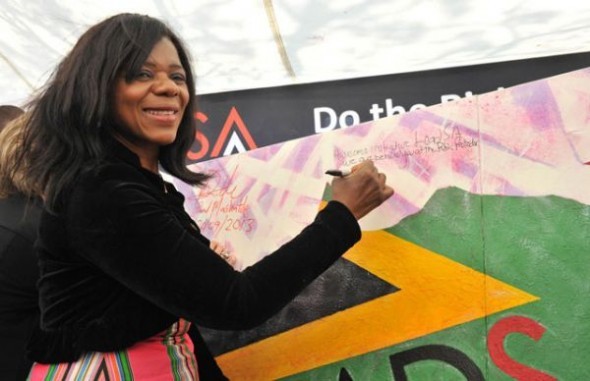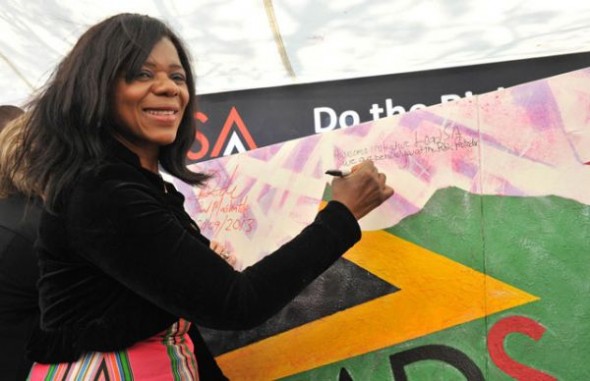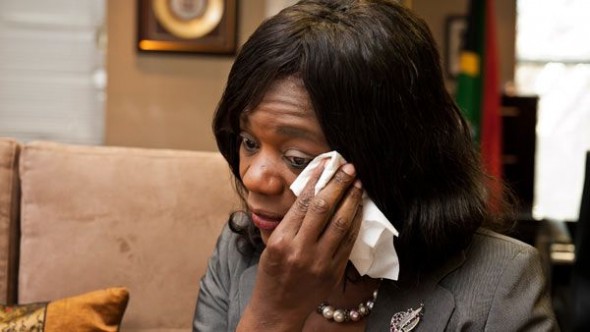
It’s Thuli Time! Thuli Madonsela on Time 100 Most Influential People list
She may not be Jesus of Jerusalem, as former Police Commissioner Bheki Cele once reminded her, but Public Protector Thuli Madonsela is one of the 100 most influential people in the world for 2014, according to Time magazine. She is, as Lamido Sanusi, former governor of the Bank of Nigeria described in the biography he penned for […]

She may not be Jesus of Jerusalem, as former Police Commissioner Bheki Cele once reminded her, but Public Protector Thuli Madonsela is one of the 100 most influential people in the world for 2014, according to Time magazine. She is, as Lamido Sanusi, former governor of the Bank of Nigeria described in the biography he penned for the magazine, “an inspirational example of what African public officers need to be”.

The Time list celebrates “the activism and innovation of thinkers, artists, visionaries, philosophers and scientists”; people who, according to the magazine, are “using their ideas, their visions [and] their actions to transform the world and have an effect on a multitude of people”.
Humbled by the gesture, Madonsela’s office released a statement in which she acknowledged the accolade; “Like several other accolades that have been bestowed on me, I regard my inclusion in the Time 100 as an acknowledgement of the selfless efforts of the Public Protector team at large.”
She went on to say she hoped the award would “alert governments of the potential of this institution as a partner in promoting good governance, thus strengthening constitutional democracy”.
Since her unopposed appointment as Public Protector in 2009, Madonsela has earned a reputation for ferocious resolve, and has used the authority of her office to build the life promised to South Africans in the country’s Constitution.

Madonsela is a pebble in the shoe for some, and the country’s biggest tell-tale (a family joke) in her daughter’s eyes. To millions of South Africans she is a breath of fresh air; a civil servant willing to take on the powerful and corrupt without fear, or favour.
As raw sewerage pooled around her heels on a visit to Soweto, on one of the 14 000 investigations her office conducts, she recalled that things were different back when she was growing up in Soweto; “I don’t remember it being this bad.”
But Madonsela cannot be accused of being nostalgic for a “better time” before democracy. She is a former teacher and accomplished union lawyer who turned down a Harvard scholarship to remain in South Africa to help craft the country’s post-apartheid constitution.
About the Office of the Public Protector
According to its website, “The mandate of the Public Protector is to strengthen constitutional democracy by investigating and redressing improper and prejudicial conduct, maladministration and abuse of power in state affairs.” The office began operating on 1 October 1995, after multi-party negotiations before the 1994 elections included an agreement to create it.
The Public Protector “has jurisdiction over all organs of state, any institution in which the state is the majority or controlling shareholder and any public entity as defined in Section 1 of the Public Finance Management Act, 1999”.
The duties and powers of the Office of the Public Protector were reaffirmed in a Supreme Court of Appeal judgement in a case between former public protector, Lawrence Mushwana, and the Mail and Guardian. The newspaper described Mushwana’s report on an investigation into oil contract funds being diverted into African National Congress (ANC) coffers as a “whitewash”. Mushwana laid a charge of defamation against the newspaper, but Justice Robert Nugent dismissed his appeal, after the case dragged through the courts for five years, and ordered he reinstate the investigation.
Nugent said, “The office of the public protector is an important institution. It provides what will often be a last defence against bureaucratic oppression, and against corruption and malfeasance in public offices that are capable of insidiously destroying the nation. If that institution falters, or finds itself undermined, the nation loses an indispensable constitutional guarantee.”
The Public Protector’s office has no power to enforce the recommendations made in her reports. However she has often made the point that her office remains important to the functioning of democracy in South Africa; “We don’t have coercive powers, but we do have persuasive powers that encourage implementation of our recommendations. We have a responsibility to strengthen constitutional democracy and we do that by ensuring that ordinary people get to speak truth to power.”
Despite threats to her safety and that of her staff, Madonsela has continued to work, unearthing the secret corruptions that her targets would rather remain hidden, but she assures that her office does not seek to harm the young democracy she had a hand in birthing.
As she told the Mail and Guardian; “It was important for me not to attack the ANC but to clarify so that people out there who know me are not left with the impression that ‘Thuli does not want the ANC to win the elections’. In the past, we always felt that the government had our back when we undertook our work. But the current events have created a climate in which we are no longer sure that the government has our back to investigate and fight maladministration.”
Madonsela sees her office as a permanent commission of enquiry that should be free from threats to undermine it, so it can investigate any issue without favour. Expressing a personal opinion, Basic Education Minister Angie Motshekga said it is for this reason Madonsela should develop a thicker skin; “The public protector is free to investigate anything so there should be no holy cows. And in return people are free to also defend their rights, so she mustn’t feel too sensitive … They have a right to raise their voice as she has a right to investigate.”
Madonsela is a staunch advocate for gender equality; she is a member of the member of South African Women Lawyers Association and Business Women’s Association of South Africa, and has authored and co-authored a number of publications on gender management, a handbook for family law, and a bench book for the equality courts.
By: Sulaiman Philip
Source: www.mediaclubsouthafrica.com
